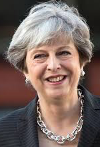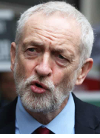|
Brexit Cross-party Talks at an End; No Deal Reached
May 17, 2019
It's unclear what's next for the United Kingdom government's plan to find support for any sort of deal to coincide with Brexit, now that cross-party talks between the nation's two largest political parties have ended. Prime Minister Theresa May and Labour leader Jeremy Corbyn have been meeting with some regularity for several weeks, in an attempt to find agreement on a plan to put in place some mechanisms for dealing with the approaching U.K. exit from the European Union. Now, however, Corbyn has pulled out of the discussions, saying that he doesn't see how any agreement could be reached. Corbyn further said that he didn't have confidence that any deal that he might strike with May would be adhered to by her successor. May, who took over the leadership of the Conservative Party after the exit of David Cameron, has attempted to shepherd the country through what has turned out to be a very complicated and divisive process. She hammered out a deal with EU leaders only to see that deal rejected by the U.K. Parliament, time and again. In a special sitting of Parliament in March, lawmakers again voted down the deal that May had negotiated with EU representatives. The vote the third time was the closest yet, at 344–286, but it was still a defeat. May had offered to resign as Prime Minister if it meant that Parliament passed the deal. Parliament had, also in March, rejected eight different alternatives to May's deal. The EU has twice granted an extension to the original March 29 deadline, itself put in place by May's evoking of Article 50 of the EU Constitution in 2017, officially announcing the U.K.'s intention to leave the EU. And now, May, who promised that she would leave her post if Parliament approved the deal, has said that she's working on a timetable for her departure. The deadline is now October 31, as set by the EU in April. Parliament is scheduled to vote yet again on May's Brexit bill–with no substantial changes being made to the bill already rejected three times, including by many lawmakers who supported Brexit in the first place–during the week of June 3. The prime minister has said that if the bill passes, the U.K. could leave the EU in July, several months before the October deadline that the EU has laid out. About the only thing that the members of the U.K. Parliament have agreed on so far is that they do not want to leave the EU without some sort of arrangement in place. May has said that no matter what happens, she will eventually resign. The Conservative Party, as the dominant player in the current coalition government, will then choose a new prime minister, who will not need to win a general election. May already survived a no-confidence vote, in December; party rules prohibit more than one such challenge in any given year. Several members of May's Cabinet have already unofficially made it known that they will seek the vacant leadership post. Britain's exiting the EU–or Brexit, as it has come to be known–is the result of a 2016 referendum that resulted in a razor-thin majority's voting to leave the EU. The U.K. has been a member of the EU since 1973. Meanwhile, U.K. voters will join the rest of the EU on May 23 in elections to the European Parliament. Recent polling suggests that many of the 73 representatives that the U.K. sends to the EP might be members of the so-called Brexit Party, led by Nigel Farage (himself a current member of the EP), who campaigned so hard before the original referendum. |
|
Social Studies for Kids
copyright 2002–2024
David White







